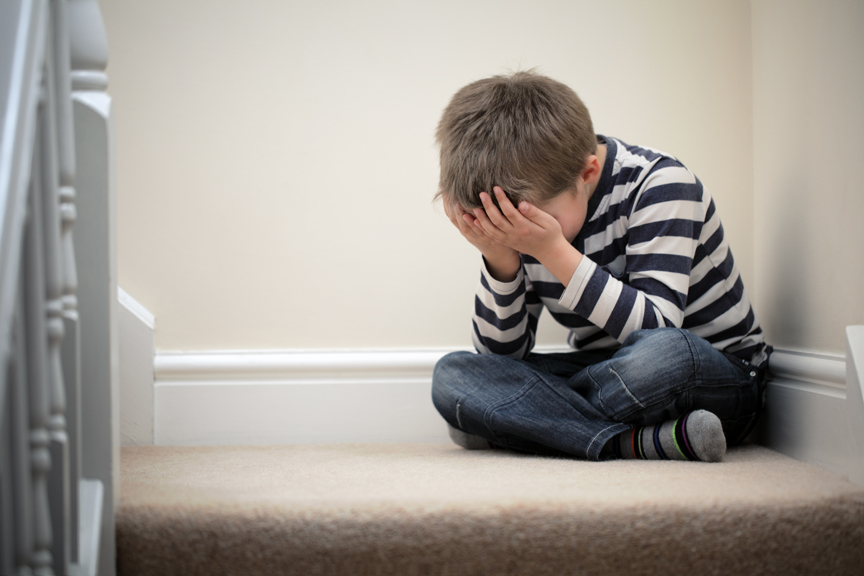- Behavior
- Health
- Parenting
Preschoolers are not too young for emotional health issues

In this article, you’ll find answers to questions like:
1. What are general red flags?
2. What are specific signs?
3. Who can help?
Sometimes it's easy to see why your child's upset. Maybe a friend left or it's time for bed. But other times, it may be hard to tell why your child is sad or moody.
Most young children lack the vocabulary or maturity to explain their problems. That leaves it up to you to figure out what's wrong — and whether a serious issue is troubling your little one.
Children can develop the same mental health issues as adults, but often express them differently. Parents and caregivers know their child best. So if a problem seems to linger too long and your child seems overly mad, sad, angry or upset, you should trust your instincts and reach out for help.
1. WHAT ARE GENERAL RED FLAGS?
While temper tantrums and bad moods are usually a normal part of childhood, they might indicate an underlying mental health concern if they're extreme or persist, says Renée Layman, chief executive officer for the Center for Child Counseling in Palm Beach Gardens, which is funded by Children’s Services Council of Palm Beach County.
“Warning signs or red flags are if the behavioral changes are intense or out of proportion to stress or changes in the environment, which can include shutting down emotionally or displays of physical aggression,” Layman says. “A depressed child may show more irritability, where an adult typically shows sadness.”
2. WHAT ARE SPECIFIC SIGNS?
Parents know their child better than anyone and are the best to assess whether their behaviors and emotions are out of the norm. Watch for:
• Mood changes, such as sadness, withdrawal, mood swings
• Behavioral changes, such as wanting to hurt others, aggression, self-harm
• Intense feelings, such as worries, fears, anxiety
• Physical symptoms, such as headaches or stomachaches
• Concentration problems, such as trouble focusing or sitting still
3. WHO CAN HELP?
If you’re a parent looking for answers, you can call a number of community helplines.
The first is Help Me Grow, run by 211 Palm Beach/Treasure Coast and funded in part by Children's Services Council.
“Early detection and intervention is key in helping children to have positive mental health outcomes,” says Patrice Schroeder, Community Relations specialist for 211. “Calls to 211 are free and confidential” and answered in English, Spanish and Creole.
Mental Health America of Palm Beach County has free online screening tools for parents, says Pam Gionfriddo, the former chief executive officer. Screening topics include depression, anxiety, bipolar disorder, post-traumatic stress syndrome and psychosis. If you have questions about your screening, you can call the national office at 800-969-6642.
“Depression or anxiety can affect any family,” she says. “We want to help families understand they are not alone.”
SOURCES:
• Pam Gionfriddo, former chief executive officer, Mental Health America of Palm Beach County
• Patrice Schroeder, Community Relations specialist, 211 Palm Beach/Treasure Coast
• Renée Layman, chief executive officer, Center for Child Counseling
You May Also Like
-
- Behavior
- Education
- Health
Ages 3-5: Running, jumping, balancing and speaking clearly
One in four U.S. children up to age 5 are at risk for developmental, behavioral or social delay. Read on for insight about key milestones from our experts and how to reach out if y …
Read More -
- Education
- Health
- Parenting
Child Find provides therapy to kids as young as 3 with delays
The Palm Beach County School District’s Child Find program continues therapy for children with developmental delays who started in other organizations' earlier programs. But enroll …
Read More
Related resources
-
- Behavior
- Health
- Other
National Alliance on Mental Illness Palm Beach County
Family-to-Family — free 12-session course for caregivers of family members with severe mental illness
561-588-3477 Website Email -
- Behavior
- Health
- Parenting
Children's Behavioral Health Collaborative - Palm Beach County
A collaboration of five local mental health agencies that assess and treat children's serious behavioral, emotional or mental health problems
561-244-9499 Website -
- Behavior
- Education
- Health
211 Palm Beach Treasure Coast
Help Me Grow – information, guidance and developmental assessment of children up to age 8
2-1-1 Website Email
